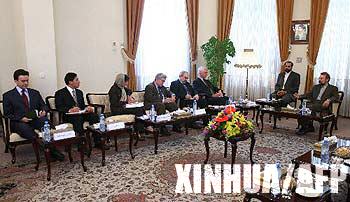
Iran's top nuclear negotiator, Ali Larijani (R), during
a meeting with envoys from China, Britain, France, Russia, Germany and
Switzerland in Tehran, Iran yesterday. -Xinhua/AFP
Iran is ready to start "serious talks" over its nuclear program as of
Wednesday, top Iranian nuclear negotiator Ali Larijani was quoted by the
semi-official ISNA news agency as saying yesterday.
"Iran now is ready for serious talks with the six world powers from this
Wednesday over the package," Larijani said.
"We handed the response with a positive view and even tried to open a way for
fair talks by interpreting the ambiguous cases logically and positively," he
added.
The official also urged the six world powers who authored the package to get
back to negotiations, adding that "the Islamic Republic is ready to play its
role as a responsible country."
The chief negotiator made the remarks to envoys from China, Britain, France,
Russia, Germany and Switzerland which is representing the United States since
Washington has no diplomatic relations with Iran.
Earlier, Larijani handed over to foreign ambassadors in Tehran Iran's formal
response to a package of proposals agreed on by six nations to solve the nuclear
standoff without disclosing any details of the reply.
However, officials close to the meeting disclosed that the response had
offered a "new formula" to resolve the disputed nuclear issue.
"Iran has given an all-sided response to the package, but also raised some
questions," one of the officials said.
Meanwhile, U.S. ambassador to the United Nations John Bolton told reporters
in New York that "we are ready to study the Iranian response carefully, but we
are also prepared, if it does not meet the terms set to proceed here in the
Security Council...with economic sanctions."
"I believe we are going to be prepared to submit elements of are solution in
the Council very quickly," he added.
Iran has promised to give an official response by Tuesday to the package of
proposals, which was authored by the United States, Russia, China, France,
Britain and Germany.
The package, designed to defuse the current tensions over Iran's nuclear
program, includes both incentives aimed at persuading Iran to suspend uranium
enrichment and possible sanctions if Iran does not comply.
The Security Council adopted a resolution late June urging Tehran to suspend
by Aug. 31 all enrichment-related and reprocessing activities, including
research and development, or face the prospect of sanctions.
The U.S. has accused Iran of secretly developing nuclear weapons under a
civilian front, a charge categorically denied by Tehran which says that its
nuclear program is for peaceful purposes.



